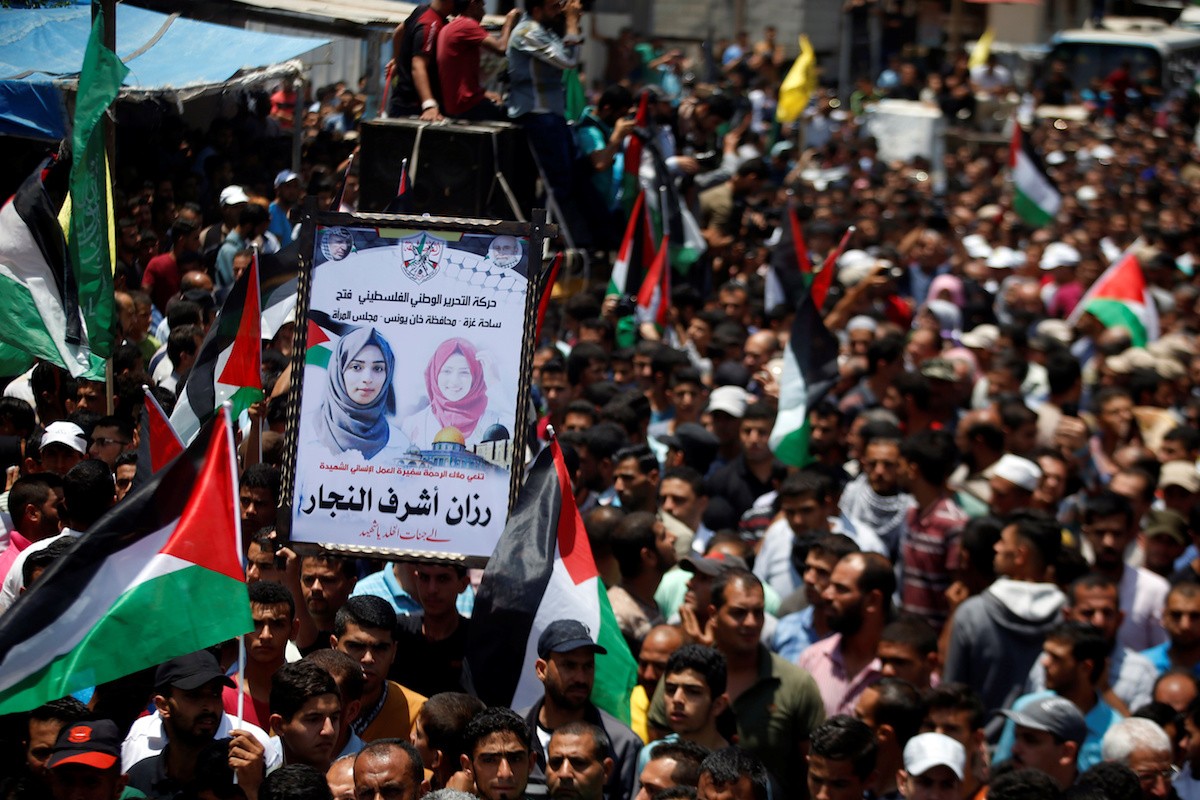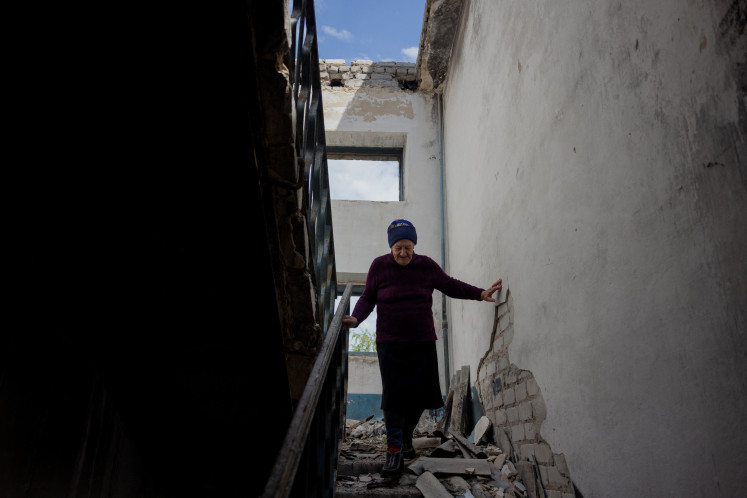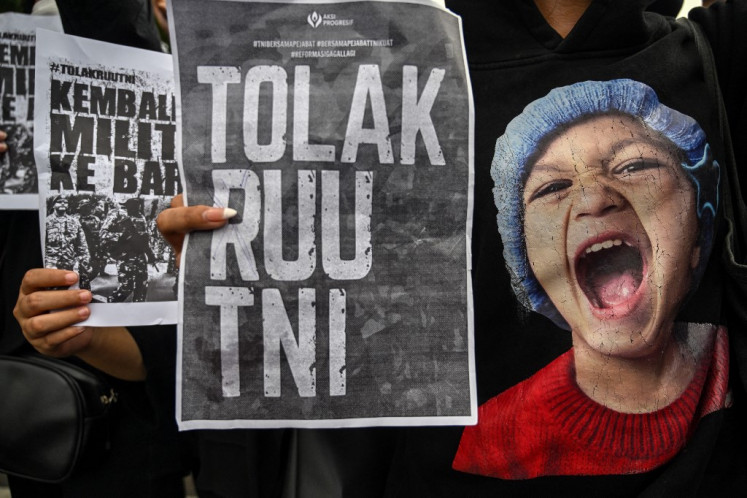Let us choose to solve Israeli-Palestinian feud
“I’m searching for a way to solve this problem [of enmity between Muslims and Jews]. And if religious dogma prevents us from finding a solution, let’s simply discard it.”
Change text size
Gift Premium Articles
to Anyone
 Mourners attend the funeral of Palestinian nurse Razan Al-Najjar, who according to health officials and a witness was killed by Israeli forces as she tried to help a wounded protester at the Gaza border, in Khan Younis in the southern Gaza Strip June 2, 2018. (Reuters/Mohammed Salem)
Mourners attend the funeral of Palestinian nurse Razan Al-Najjar, who according to health officials and a witness was killed by Israeli forces as she tried to help a wounded protester at the Gaza border, in Khan Younis in the southern Gaza Strip June 2, 2018. (Reuters/Mohammed Salem)
I
don’t know if there is anyone among us who witnessed how the Israeli-Palestinian conflict began. Yet clearly, we are all children born of a troubled history.
A multi-generational saga that spans continents and is deeply suffused with suspicion, pain, anger and hatred. A complex and traumatic history that continues to roll ever onwards, completely beyond our control. A history that has bequeathed us mutual hostility and bondage, as though we were enslaved by fate itself.
Do we wish to bequeath this anguished heritage to future generations? Are we content to allow our children and grandchildren to experience the immense pain and misfortune that our Muslim and Jewish ancestors have had to bear?
Great men and women have come and gone. Some of them, like Anwar Sadat, have taken the boldest of actions. Some have struggled to annihilate their enemies, and others have struggled in search of reconciliation. And yet, today, we still find ourselves mired in conflict.
Sixteen years ago my spiritual mentor, Kyai Haji Abdurrahman Wahid, shared his compelling vision of how we might seek to resolve the Israeli-Palestinian conflict. He observed that virtually all peace efforts undertaken to date had focused purely on the political and military dimensions of this problem and, perhaps for that very reason, failed to attain success. “Gus Dur”, as the late president was fondly known, thought it would be useful to add a third — dare we say, transcendent — dimension to these efforts, by engaging religious leaders capable of enlivening the most profound spiritual aspirations and values among their followers.
Gus Dur was acutely aware of the difficulties that lie in the way of executing such an idea. He was a man of profound vision, but also a realist who knew that every religion harbors contradictory interpretations and schools of thought, with intense theological competition — and sometimes outright conflict — raging between followers of a single religion. Thus, the idea of engaging religious leaders to help negotiate peace may sound appealing in theory, but would certainly be difficult to execute.
Several weeks ago at the Israeli Embassy in Washington, DC, a gentleman who was about to perform aliyah asked me to confirm that the teachings of Islam encourage enmity towards Jews. I chose not to answer his question directly. Instead I replied, “I’m searching for a way to solve this problem [of enmity between Muslims and Jews]. And if religious dogma prevents us from finding a solution, let’s simply discard it.”
Of course, it is not my intention to suggest that people abandon their religion. I myself believe in God and His messengers: Abraham, Moses, Jesus, Muhammad and countless others. If confronted with a choice between my faith and life itself, I would not hesitate to choose faith.
But dogma is merely an interpretation of religious truth. It is not Truth itself — al-Haq, in Arabic — an attribute that pertains solely to God. If a particular religious interpretation does not help solve our problems, let’s not hesitate to explore other interpretations — rooted in the essential values and teachings of religion — that are more suited to our present time and the actual circumstances we face.
If, in the midst of a bitter feud, we constantly insist upon viewing others as our enemies, how can we ever glimpse — much less create — an opportunity for peace? What’s the point of sharing this or that peace strategy; of agreeing to this or that accommodation; of expressing this or that lofty sentiment, if we’re unwilling to abandon the goal of either crushing or annihilating our opponents?
‘ ... if religious dogma prevents us from finding a solution, let’s simply discard it.’
If we wish to end the Israeli-Palestinian conflict, we must eliminate its cause. And if we read between the lines of what people are saying, it appears that nearly everyone claims the fundamental cause of this conflict is injustice of one kind or another, perpetrated by one side or the other. So each party demands justice. Yet each has its own traumatic historical experience, which shapes its perspective as to what is fair and unfair. And, thus, the conflict continues unabated.
This phenomenon concerns a simple fact that everyone knows, and yet most are reluctant to embrace as a guiding principle in life. Justice is not simply a matter of demanding equity for oneself, but also about providing justice to others. It is nearly impossible to behave justly toward others, unless we feel love and compassion for them.
When I speak of love, compassion and justice, I am speaking about the very essence and spirit of religion. The essence and spirit of faith.
So perhaps we can see that the root of the Israeli-Arab conflict is not injustice, but hostility. Anger and resentment encourage human beings to act unjustly, as they seek to injure their perceived enemies.
What does it take to relinquish hostility and resentment toward others? Does the disavowal of enmity require that all parties first feel satisfied they have obtained full and complete justice? How is that even possible, when each party to a bitter dispute has a different way of calculating justice, and insists on either crushing or annihilating its enemies?
No. Relinquishing enmity is a matter of personal and collective choice. Do we choose revenge or forgiveness? Do we choose hatred or affection? Do we choose conflict to the bitter end, or work to establish peace and cooperation for the betterment of ourselves and humanity at large?
Obviously the choices that lead to peace are not easy choices. But so long as we refuse to alter our choices, there will be no way out of this perpetual conflict.
May God help us to lay aside our shared history of pain and suffering and deliver us from affliction, by aligning ourselves with His Divine Wisdom and Grace, for there is no strength or power to accomplish anything in this world, without His aid.
***
The writer is secretary-general of the Nahdlatul Ulama supreme council. The article is based on his presentation at the opening plenary session of the American Jewish Committee Global Forum in Jerusalem on June 10.










